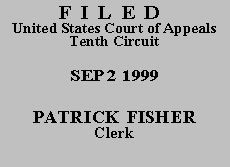

| JESSE L. GARCIA,
v.
TIM LEMASTER |
|
Petitioner-Appellant Jesse Garcia brought this 28 U.S.C. § 2254 petition for a writ of habeas corpus challenging New Mexico's revocation of his probation. He raised three claims in the district court but failed to brief one of them. The district court referred the case to a magistrate judge, who recommended denial of the two briefed claims. After the magistrate issued his proposed findings and recommendations, petitioner filed a request for supplemental briefing on the omitted claim. The magistrate denied this request. The district court adopted the magistrate's proposed recommendations and denied petitioner's objection to the denial of supplemental briefing. Petitioner timely appealed after unsuccessfully seeking a certificate of appealability from the district court. We deny a certificate of appealability and dismiss the petition.
Petitioner argues three grounds for relief in his appeal. First, he claims he was denied effective assistance of counsel at his probation revocation hearing. Second, he claims the reimposition of his suspended sentence of almost twenty years for twenty separate misdemeanor counts of attempted breaking and entering constitutes an excessive punishment in violation of the Eighth Amendment. Third, he alleges he was denied due process by the magistrate's refusal to allow him, out of time, to brief his waived argument of bias on the part of the sentencing judge.
Garcia pled guilty to twenty counts of attempted breaking and entering and
received twenty sentences of 364 days each, to run consecutively. The sentencing judge suspended the sentence for a five year probationary period and required petitioner to attend a drug rehabilitation program. Garcia left the rehabilitation program without permission on May 25, 1995 because, he claimed, a severe dental problem required him to seek treatment. On June 16, 1995, a probation officer filed a report noting petitioner had left the program without authorization. Authorities did not hear from petitioner again until he was arrested on December 22, 1995. After the arrest, the government initiated probation revocation proceedings. The state district judge found eight specific probation violations, including leaving the drug treatment program without permission, committing a battery on a police officer, resisting arrest, failing to submit monthly reports to his probation officer from June to December, 1995, and moving without notifying his probation officer of his new residence. Given these probation violations, the district judge reinstated the suspended sentence.
Mr. Garcia's ineffective assistance of counsel claim rests on his contention that his counsel at the probation revocation proceeding failed to investigate the circumstances of his "dental emergency" that caused him to leave his drug treatment program. To prevail on his ineffective assistance claim, petitioner must show that this failure to investigate his medical problem was objectively
unreasonable and that the failure was prejudicial. See Strickland v. Washington, 466 U.S. 668, 688, 694 (1984). We need not evaluate the reasonableness of counsel's actions because the record makes clear that petitioner suffered no prejudice from counsel's alleged error. While medical evidence may have confirmed Mr. Garcia's reason for leaving his drug treatment program, it would have done little to explain or mitigate the other violations. Notably, petitioner offered no evidence that he tried to return to the drug treatment program after he sought medical assistance for his tooth. On the contrary, he disappeared and did not communicate with his probation officer for seven months. Additionally, he resisted arrest and physically assaulted a police officer. Therefore, petitioner's first claim has no merit.
Petitioner's Eighth Amendment argument also fails. "The Eighth Amendment requires that a sentence not be disproportionate to the severity of the crime or involve unnecessary infliction of pain." United States v. Youngpeter, 986 F.2d 349, 355 (10th Cir. 1993) (citing Solem v. Helm, 463 U.S. 277, 284 (1983)). According to petitioner, a sentence of almost twenty years is constitutionally disproportionate for a probation violation. This argument misses the point. The sentence was imposed for petitioner's original crimes. The trial court decided to suspend the sentence, and petitioner's probation violations
simply reactivated it. Mr. Garcia's sentence certainly fell within constitutional bounds when we consider the large number of offenses to which he pled.
Finally, Mr. Garcia argues that the magistrate's denial of his request for supplemental briefing on his claim of judicial bias violated his due process rights. We disagree. The magistrate denied petitioner's motion for supplemental briefing because the motion came after the magistrate had already issued his proposed findings. The district court found the ruling neither clearly erroneous nor contrary to law, see 28 U.S.C. § 636(b)(1), and affirmed it. We reach the same conclusion. Effectively, petitioner waived his judicial bias claim by failing to brief it in a timely manner. We find no due process violation stemming from petitioner's own oversight. Moreover, "[p]oints raised but not argued below ordinarily will not be considered on appeal." Rademacher v. Colorado Ass'n of Soil Conservation Dists. Med. Benefits Plan, 11 F.3d 1567, 1571 (10th Cir. 1993). Therefore, this argument provides petitioner with no ground for relief.
We have carefully reviewed petitioner's request for a certificate of appealability, the district court order, and the entire record on appeal. That review demonstrates that petitioner has not made a "substantial showing of the denial of a constitutional right." See 28 U.S.C. § 2253(c)(2). Accordingly, we
DENY petitioner's request for a certificate of appealability and DISMISS this appeal.
ENTERED FOR THE COURT,
Deanell Reece Tacha
Circuit Judge
*.This order and judgment is not binding precedent, except under the doctrines of law of the case, res judicata, and collateral estoppel. This court generally disfavors the citation of orders and judgments; nevertheless, an order and judgment may be cited under the terms and conditions of 10th Cir. R. 36.3.